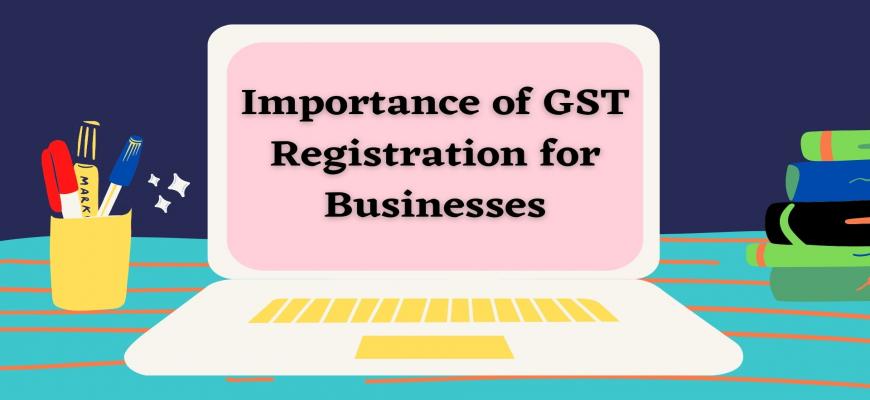Welcome to Tax Box India
Request a call back.

Importance of GST registration for Businesses
Written By:-Vipul Arora
To ensure Tax Compliance, it is very important for the Taxable Person/Business in India to follow the norms and procedures laid down under the Goods and Services Tax Act, 2017. Hence, for the identification of taxpayers, Registration is the preliminary and the most important requirement under Goods and Services Tax laws in India.
Goods and Services Tax Act has come into force in India w.e.f. 1st July 2017. Under Goods and Services Tax laws, the tax is charged on the supply of goods and services.
Who are mandated to get a GST Registration?
Every supplier of Goods or Services or both shall be required to take a GST Registration if its aggregate turnover in any financial year exceeds the threshold limit of Rs. 20 Lakhs. With effect from 1st April 2019, the exemption limit for GST Registration has been increased from Rs. 20 Lakhs to Rs. 40 Lakhs, but only in case of a supply of Goods. However, for some Special Category States, the limit for GST Registration is Rs. 10 lakhs.
Therefore, to avail the benefits under GST and to avoid heavy penalties, it is essential for every taxable person/business to get GST Registration.
According to Sec. 24 of the CGST Act, there are various circumstances under which the threshold limit is not applicable and there are instances where the GST Registration in India is compulsory; e.g., a person making inter-state supplies, e-commerce operators, non-resident individuals making taxable supplies, etc.
Small Taxpayers and Medium Enterprises whose aggregate turnover does not exceed Rs. 20 Lakhs or Rs. 10 Lakhs are not required to get a GST Registration in India. However, such small taxpayers may take GST Registration voluntarily to avail benefits under GST laws.
Why importance of GST Registration for businesses?
- Improves Creditability
- Avail Benefits of Input Tax Credit
- Relief to Small Taxpayers
- Accountability
- Avoid heavy penalties and unnecessary hurdles
Now we will know in details about importance of GST registration for businesses
Improves Creditability: GST Registration gives legal recognition and legal authority. A business that complies with the rules and regulations and is legally recognized always puts a good impression upon the creditors and buyers. This in turn improves the trustworthiness of the business. GST Registration also gives a legal authority to collect taxes from the customers and also avail Input Tax Credit benefits on the taxes paid by them.
Avail Benefits of Input Tax Credit: Goods and Services Tax removed the cascading effect (i.e., tax on tax). Only the value-added at every stage is taxed under GST. Therefore, the supplier at every stage can avail tax credit on their purchases and can set off the same for payment of taxes on supply of Goods and Services made by them. This Input Tax Credit can be claimed by the supplier only if the other party has a GST Registration. Therefore, Suppliers always prefer to deal with registered taxpayers.
Relief to Small Taxpayers: For Small and Medium taxpayers, a simplified composition scheme is available. The taxpayer may opt for this scheme if its aggregate turnover in any financial year does not exceed Rs. 1.5 Crores. The composition scheme provides a lesser compliance burden and cost. Under this scheme, the taxpayers are required to pay a fixed rate of tax on their turnover, and they are required to file quarterly returns. Therefore, to avail the benefits of the composition scheme, the small and medium taxpayers can take GST Registration under this composite scheme.
Accountability: After getting a GST Registration, the business enterprises maintain proper books of accounts and also maintain proper compliance with respect to accounting and recordkeeping. If a business is GST registered, its books of accounts will be well kept because of which the businesses will have a less likelihood of losing money.
Avoid heavy penalties and unnecessary hurdles: Penalties can be imposed by the departmental authorities if a taxable person/business entity does not properly comply with GST Registration and its compliances thereof. According to Section 122 of the CGST Act, penalties can also be imposed on offences like non-payment of taxes, short payment of taxes, improper utilization of input tax credit, etc. Therefore, to avoid unnecessary hurdles and to maintain trustworthiness, the taxable person/business entity should follow the norms and procedures laid down in the GST Act and get GST Registration Online as and when required. The CGST Act also gives power to the authorities to confiscate the goods in case any taxable person/business entity is found to have not complied with the GST norms. The heavy penalties or confiscation of goods can create a negative impact on the authorities, and once a taxpayer/business entity comes under the radar of the authorities, there always looms a fear that the authorities might take stringent actions against the individual/business entity in the future. If the amount of penalty imposed is very high, then it may also lead to the shutting down of the business.
Initially, when the GST Act was passed by the Parliament, the individual taxpayers/business entities were facing a lot of confusion regarding the process of GST Registration and its compliances thereof. However, with the passage of time, the Government took initiatives to simplify the compliances of GST Registration and made GST Registration Online without physical submission of documents to the authorities. Such regular clarities have helped people to understand the importance of GST Registration in India.
Taxboxindia.com can help in GST Registration,ISO Certification,FSSAI Registration,Company Registration,GST Return Filing,IEC Registration,RCMC,Income tax return filing,OPC formation,Partnership firm Registration and many more services. We have tried to conclude all the points related to above article,in case you need support for any registration and annual filing services,you can reach to us at info@taxboxindia.com,taxboxindia@gmail.com or post your query on https://www.taxboxindia.com/contact-us.php.
@2020 www.taxboxindia.com . All rights reserved. | Design & Developed By :- Easy Dots Technologies

